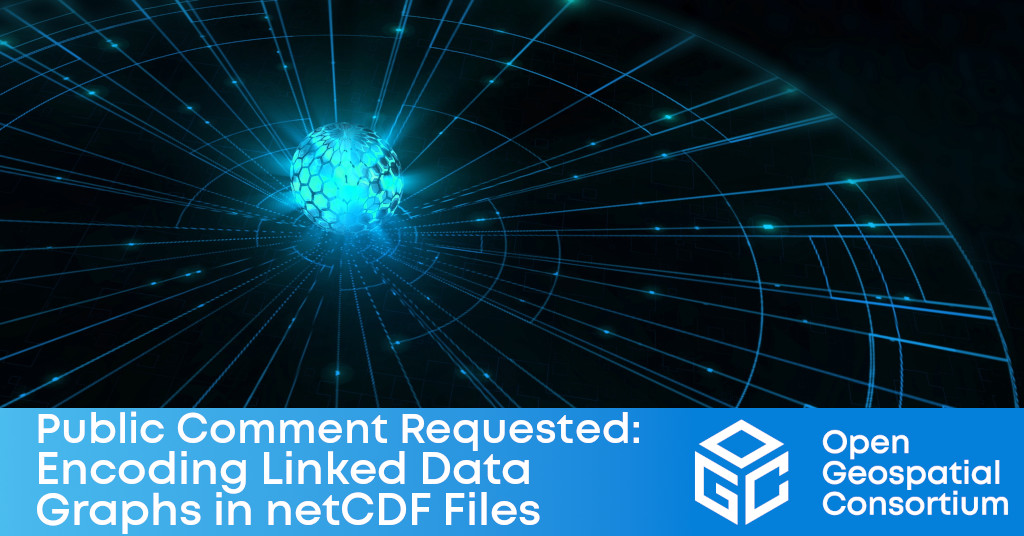netCDF-LD provides the encoding standard for encoding linked data semantics into netCDF files and interpreting netCDF files as RDF graphs, enhancing data findability and re-use.

The Open Geospatial Consortium (OGC) seeks public comment on the candidate OGC Encoding Linked Data Graphs in netCDF Files Standard (netCDF-LD). NetCDF-LD is an approach for constructing Linked Data descriptions using the metadata and structures found in netCDF files. Comments are due by June 24, 2022.
NetCDF is a format for encoding array-oriented scientific data, particularly in many Earth & Space Science domains. It is common practice to aid interoperability of netCDF files in the Earth sciences by using the Climate and Forecasting (CF) convention and also the Attribute Convention for Data Discovery (ACDD). Several communities are defining additional netCDF conventions for describing the semantics relating to their different domains. As the concurrent use of multiple – and possibly clashing or conflicting – netCDF conventions spreads, the problem of finding a common mechanism to validate and interpret metadata embedded inside netCDF files grows. The candidate netCDF-LD Standard offers a solution to that problem.
Linked Data (LD) is a World Wide Web Consortium best practice for encoding and publishing metadata to expose and connect data both within individual datasets and across multiple datasets. LD also allows dataset descriptions to become more useful by running semantically enabled queries across datasets. Linked Data uses the W3C Resource Description Framework (RDF) to express the information and relationships. Publishing netCDF file descriptions using LD methods presents the user community with an opportunity to benefit from LD's improved exposure and connection and, in turn, make published data more Findable, Accessible, Interoperable, and Re-usable (FAIR).
The candidate netCDF-LD Standard provides a standard for encoding linked data semantics into netCDF files and interpreting netCDF files as RDF graphs with minimal or little changes to existing netCDF files. NetCDF files adopting the netCDF-LD standard and assembled into RDF graphs can be used with other Linked Data technologies for data fusion, powerful querying and data discovery. NetCDF-LD also enables the capture of enhanced netCDF metadata, enabling information found in netCDF files to be linked with published conventions and controlled vocabularies used to express the content, thus improving semantic interoperability and consistency.
OGC Members interested in staying up to date on the progress of this standard, or contributing to its development, are encouraged to join the netCDF SWG via the OGC Portal.
The candidate Encoding Linked Data Graphs in netCDF Files Standard is available for review and comment on the OGC Portal. Comments are due by June 24, 2022. and should be submitted via the method outlined on the Encoding Linked Data Graphs in netCDF Files Standard's public comment request page.
About OGC
The Open Geospatial Consortium (OGC) is a collective problem-solving community of experts from more than 500 businesses, government agencies, research organizations, and universities driven to make geospatial (location) information and services FAIR – Findable, Accessible, Interoperable, and Reusable.
The global OGC Community engages in a mix of activities related to location-based technologies: developing consensus-based open standards and best-practice; collaborating on agile innovation initiatives; engaging in community meetings, events, and workshops; and more.
OGC's unique standards development process moves at the pace of innovation, with constant input from technology forecasting, practical prototyping, real-world testing, and community engagement.
OGC bridges disparate sectors, domains, and technology trends, and encourages the cross-pollination of ideas between different communities of practice to improve decision-making at all levels. OGC is committed to creating an inclusive and sustainable future.
Visit ogc.org for more info on our work.
“






